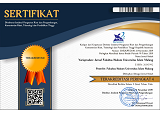THE IMPLEMENTATION OF TRANSITIONAL JUSTICE IN CONTEMPORARY INDONESIA: A LESSON FROM MALUKU EXPERIENCE
DOI:
https://doi.org/10.33474/yur.v1i1.742Abstract
Isu kekerasan saat ini terus menarik perhatian publik seiring dengan gelombang bebas berekspresi, terlebih sejak masa reformasi tahun 1998. Angka kekerasan meningkat drastis, terkhusus kekerasan atas nama agama. Salah satu contoh kasus yang menjadi sorotan publik global adalah kasus kekerasan berbasis etnik dan agama di Maluku dengan jumlah korban meninggal mencapai 5000 jiwa dan lebih dari 7 juta penduduk direlokasi. Dengan menggunakan teori transitional justice dan resolusi konflik sebagai kerangka analisis, artikel ini akan meneliti sejauh mana kekuatan dan kelemahan strategi yang diterapkan dalam proses keadilan transisional pasca insiden Maluku. Hasil analisis menunjukkan bahwa meskipun bentrokan antar kelompok dapat tertangani melalui penegakan hukum dan berbagai proses mediasi, banyak kendala di lapangan dalam penegakan keadilan transisional yang salah satu faktornya adalah karena kurang adanya komitmen stakeholders dalam menimplementasikan proses tersebut secara komprehensif. Sebagai konsekuensi, kejadian serupa dapat berpotensi terulang kembali. Untuk mengatasinya, beberapa tawaran rekomendasi diajukan sebagai langkah preventif.
Kata kunci: Keadilan transisional, kekerasan, resolusi konflikReferences
Al Qurtuby, S. (2013). Peacebuilding in Indonesia: Christian–Muslim Alliances in Ambon Island. Islam and Christian–Muslim Relations, 24(3), 349-367.
Anderlini, S. N., Conaway, C. P., & Kays, L. (2004). Transitional justice and reconciliation. Inclusive security, sustainable peace: A toolkit for advocacy and action, 12.
Barash, D. P., & Webel, C. P. (2013). Peace and conflict studies: California. SAGE Publications, Incorporated.
Bhakti, I. N., Yanuarti, S., & Nurhasim, M. (2009). Military Politics, Ethnicity and Conflict in Indonesia: University of Oxford. Centre for research on inequality, human security and ethnicity (CRISE).
Boraine, A. L. (2006). Transitional justice: a holistic interpretation. Journal of International Affairs, 60(1), 17.
Brahm, E. (2004). Truth Commissions. Retrieved on 8 November 2017 from http://www.beyondintractability.org/essay/truth-commissions
Duncan, C. R. (2008). Where do we go from here? The politics of ending displacement in post-conflict North Maluku. Conflict, Violence, and Displacement in Indonesia, Cornell University Southeast Asia Program Publications, Ithaca, NY.
Duncan, C. R. (2009). Monuments and martyrdom: Memorializing the dead in post-conflict North Maluku. Bijdragen tot de taal-, land-en volkenkunde/Journal of the Humanities and Social Sciences of Southeast Asia, 165(4), 429-458.
Ernas, S. (2012). Policy of Social Resolution: Implementation of the Malino Agrement in Maluku. Jurnal Studi Pemerintahan, 3(2).
Fischer, M. (2011). Transitional justice and reconciliation: Theory and practice. Advancing Conflict Transformation. The Berghof Handbook, 2.
Hayner, P. B. (1994). Fifteen truth commissions-1974 to 1994: A comparative study. Hum. Rts. Q., 16, 597.
Human Right Watch Asia. (1999). The violence in Ambon. Retrieved on 3 November 2017 from http://www.hrw.org/hrwr/eports/1999/ambon/
ICTJ. (2008). ICTJ Interview with a former member of the investigation team. Jakarta.
ICTJ. (2011). Transitional justice in the United Nations Human Right Council: International Center for Transitional Justice.
ICTJ, & KontraS. (2011). Derailed: Transitional Justice in Indonesia since the fall of Soeharto.
International Center for Transitional Justice. (n.d.). What is transitional justice. Retrieved on 1 November 2017, from http://ictj.org/about/transitional-justice
Lambourne, W. (2009). Transitional justice and peacebuilding after mass violence. International Journal of Transitional Justice, ijn037.
Lange, K. M. (2000). Prospects for Conflict Transformation in Maluku: Mapping Assets, Spaces and Moments for Peace Building.
Malik, I. (2003). Bakubae: The community based movement for reconciliation process in Maluku: Published in cooperation [among] BakuBae Maluku, Tifa Foundation, and Yayasan Kemala.
McRae, D. (2007). Criminal justice and communal conflict: a case study of the trial of Fabianus Tibo, Dominggus da Silva, and Marinus Riwu. Indonesia, 79-117.
Palmer, B. (2004). Memories of Migration: Butonese Migrants returning to Buton after the Maluku conflicts 1999–2002. Antropologi Indonesia, Special Volume.
Pariela, T. D. (n.d.). Political Process, Public Policy, and Peace Building Process: Case of Ambon City, Maluku.
Parmentier, S. (2003). Global justice in the aftermath of mass violence. The role of the International Criminal Court in dealing with political crimes. Annales Internationales de Criminologie-International Annals of Criminology-Anales Internacionales de Criminologia, 41(1-2), 203-224.
Reid, A. (2011). Southeast Asia. The Singapore and Melaka Straits: Violence, security and diplomacy in the 17th century. By Peter
Borschberg. Singapore: NUS Press, and Leiden: KITLV Press, 2010. Pp. 394, Maps, Illustrations, Index. Journal of Southeast Asian Studies, 42(03), 543-546.
Sharp, S. (2011). Framing religious conflict: Primordialism writ large.
UN General Assembly. (2005). Basic Principles and Guidelines on the Right to a Remedy and Reparation for Victims of Gross Violations of International Human Rights Law and Serious Violations of International Humanitarian Law. Retrieved on 5 November 2017 from http://www.ohchr.org/EN/ProfessionalInterest/Pages/RemedyAndReparation.aspx
United Nations. (2010). Guidance note of the secretary-general: United Nations approach to transitional justice.
Van Klinken, G. (2001). The Maluku wars: bringing society back in. Indonesia, 1-26.
Wessel, I. (2001). The politics of violence in New Order Indonesia in the last decade of the 20th century. Violence in Indonesia, 64-81.
Wessel, I., & Wimhöfer, G. (2001). Violence in Indonesia: Abera-Verlag Meyer.












